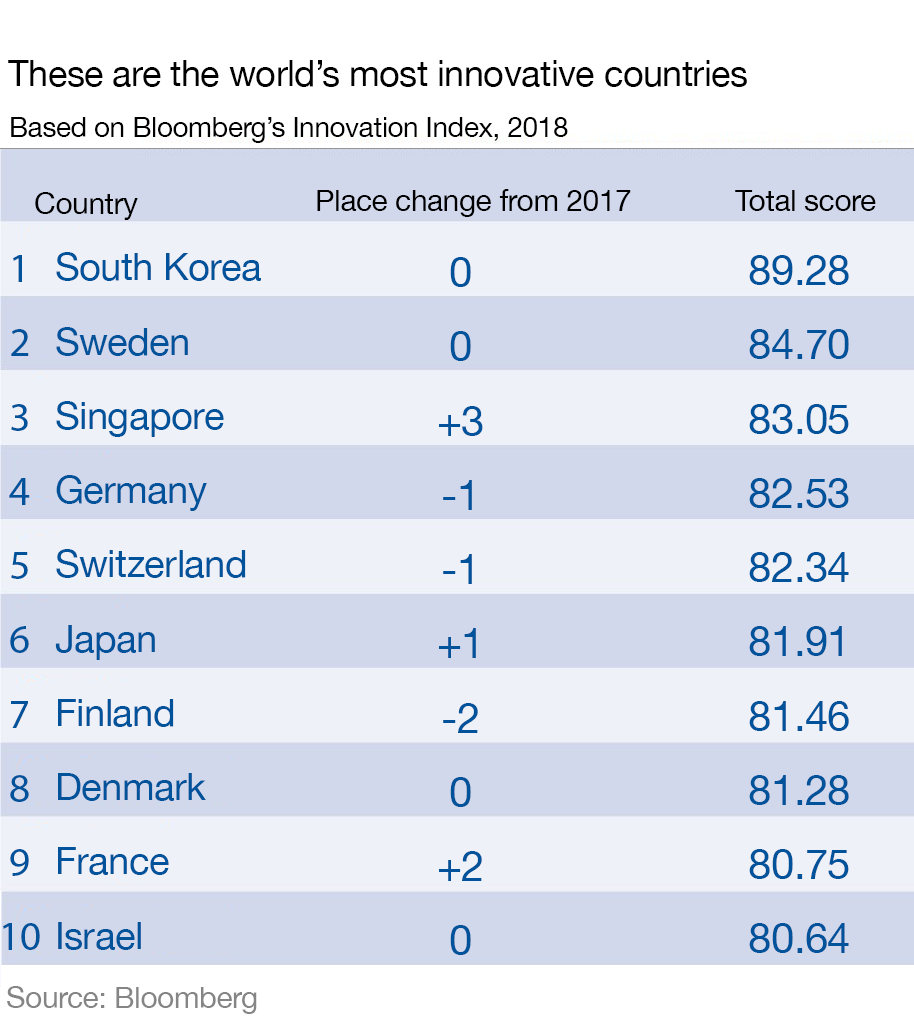South Korea and Sweden are the most innovative countries in the world

These are the most innovative countries in the world, South Korea, Sweden and Singapore top the list. Image: REUTERS/Carlo Allegri
South Korea and Sweden are the most innovative countries in the world, according to a league table covering everything from the concentration of tech companies to the number of science and engineering graduates.
The index on innovative countries highlights South Korea’s position as the economy whose companies filed the most patents in 2017.
Bloomberg, which compiles the index based on data from sources including the World Bank, IMF and OECD, credits South Korea’s top ranking to Samsung.
The electronics giant is South Korea’s most valuable company and has received more US patents than any company other than IBM since the start of the millennium. This innovation trickles down the supply chain and throughout South Korea’s economy.

Sweden in second place is fast gaining a reputation as Europe’s tech start-up capital.
The Scandinavian country is home to Europe’s largest tech companies and its capital is second only to Silicon Valley when it comes to the number of “unicorns” – billion-dollar tech companies – that it produces per capita.
Education hinders the US
The US dropped out of the top 10 in the 2018 Bloomberg Innovation Index, for the first time in the six years the gauge has been compiled.
Bloomberg attributed its fall to 11th place from ninth last year largely to an eight-spot slump in the rating of its tertiary education, which includes an assessment of the share of new science and engineering graduates in the labour force. The US is now ranked 43 out of 50 nations for “tertiary efficiency”. Singapore and Iran take the top two spots.
The US’ ranking marks another setback for its higher education sector’s global standing in recent months: in September it was revealed neither of the world’s top two universities were considered to be American. Those honours went to the UK’s Oxford and Cambridge universities respectively.
In addition to the US’ education slump in the innovation index, Bloomberg claims the country also lost ground when it came to value-added manufacturing. The country is now ranked in 23rd place, while Ireland and South Korea take the top two spots.
Despite these setbacks, the Bloomberg Innovation Index still ranks the US as number 1 when it comes to its density of tech companies. The US is also second only to South Korea for patent activity.
These rankings may explain the disparity between Bloomberg’s list of innovative countries and the World Economic Forum’s own list of the 10 most innovative economies.

Under this ranking, compiled as part of The Global Competitiveness Report 2017-2018, the US is listed as the second most innovative country in the world after Switzerland.
The US’ inclusion in this league table, and South Korea’s exclusion, are the two most notable differences between the different rankings.
Other than these nations, the majority of countries included in the top 10s are the same in both lists.
Tech titan Israel
One nation to feature prominently in both innovation rankings is Israel.
Taking third spot in the Global Competitiveness Report’s innovation league table, Israel is ranked 10th best country in the world for innovation overall by Bloomberg. However, its index also ranks Israel as number 1 for two categories of innovation: R&D intensity and concentration of researchers.
Israel’s talent for research and development is illustrated by some of the major tech innovations to come out of the country. These include the USB flash drive, the first Intel PC processor and Google’s Suggest function, to name just three.
Despite being smaller than the US state of New Jersey with fewer people, Israel punches well above its weight on the global tech stage.
It has about 4000 startups, and raises venture capital per capita at two-and-a-half times the rate of the US and 30 times that of Europe.
When it comes to being a world leader at innovation, it may simply be the case that you get out what you put in: according to OECD figures, Israel spends more money on research and development as a proportion of its economy than any other country – 4.3% of GDP against second-placed Korea's 4.2%.
Switzerland is in third place spending 3.4% of its GDP on R&D, while Sweden spends 3.3%. The US spends just 2.8%.
Don't miss any update on this topic
Create a free account and access your personalized content collection with our latest publications and analyses.
License and Republishing
World Economic Forum articles may be republished in accordance with the Creative Commons Attribution-NonCommercial-NoDerivatives 4.0 International Public License, and in accordance with our Terms of Use.
The views expressed in this article are those of the author alone and not the World Economic Forum.
Stay up to date:
Innovation
Related topics:
Forum Stories newsletter
Bringing you weekly curated insights and analysis on the global issues that matter.
More on Global CooperationSee all
Sebastian Buckup and Maximilian Martin
November 13, 2025






